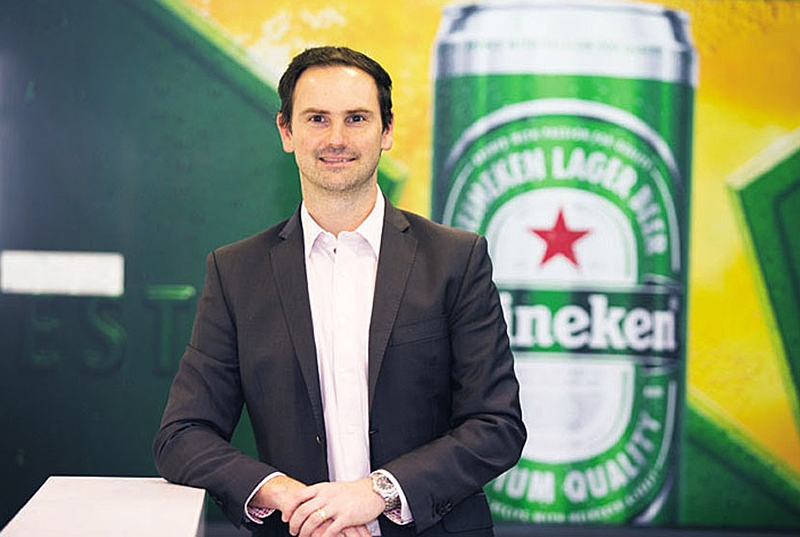HEINEKEN powering the windmill of sustainability
 |
Matt Wilson, corporate affairs director of HEINEKEN Vietnam–named Vietnam’s most sustainable manufacturing company in 2017–talked with VIR’s Bich Thuy about how to incorporate sustainable practices into its core business and its future strategies to provide long-term socio-economic benefits.
HEINEKEN Vietnam has been recognised as a pioneer in sustainable development. Could you give some examples of how HEINEKEN has supported the achievement of sustainable development goals (SDGs) in Vietnam?
Throughout our 27-year journey of “Brewing a Better Vietnam,” HEINEKEN Vietnam chooses green by taking care of our people and the planet to sustain prosperity for a better Vietnam. We integrate sustainability into our core business strategy to set new benchmarks in sustainable development through continuous improvement, rigorous assessment, and the communication of our progress. Our sustainability strategy focuses on six key areas that allow us to contribute the most to the local community Vietnam, in line with the UN SDGs: advocating responsible consumption, promoting health and safety, protecting water resources, reducing CO2 emissions, growing with communities, and sourcing sustainably. In 2017, HEINEKEN Vietnam invested VND16 billion ($720,720) into responsible consumption initiatives, reaching 10 million Vietnamese consumers, supporting SDG 3 (good health and well-being), SDG 12 (responsible consumption and production), and SDG 17 (partnerships for the goals).
We also pioneered the circular economy model and are close to creating zero waste to landfills from our production sites. 99.01 per cent of our waste and by-products were re-used or recycled, implementing SDG 12 (responsible consumption and production) and SDG 15 (life on land). Four out of six HEINEKEN breweries in Vietnam brew with 100 per cent renewable energy, implementing SDG 7 (affordable and clean energy) and SDG 13 (climate action). What is more, we support SDG 8 (decent work and economic growth). In 2017, HEINEKEN Vietnam contributed VND 42.3 trillion ($1.8 billion) to Vietnam’s economy, equivalent to 0.88 per cent of the country’s total GDP.
What are the major impacts of the firm’s sustainability accomplishments?
The impacts are very positive. We have been on this journey for a while, and the more we are committed to sustainability and look for partnerships that help us deliver the SDGs, the more value it actually creates. I can give you an example of clean energy for SDG 7, where we switched from using diesel boilers to power our breweries to using clean biomass energy. This initiative helps us deliver on SDG 7 by raising our mix of renewable energy, but it also reduces our costs and generates additional income for rice farmers, from whom we buy the rice husks. Besides, it has reduced our carbon emissions by over 50 per cent over the last few years. This is a great example of how pursuing the SDGs has actually benefited us and increased our competitiveness as a company, as well as supported the environment and our community.
What difficulties does HEINEKEN face when following the SDGs in Vietnam?
One of the difficulties is finding a suitable partner. I think sustainability is still a relatively new concept in Vietnam, although there has been a lot of progress in the last few years. We have seen an increasing number of companies commit to sustainability, become aware of the SDGs, and want to partner with us, so we expect more opportunities to come up in the future. I can give you an example. If you look at some of the things we are doing, such as with biomass and exploring more solar power, we don’t act alone. We need biomass and solar suppliers, and, what is especially important, the right regulatory framework created by the Vietnamese government. When we have more partners with the same intention and the same mindset, we can all achieve real acceleration towards the sustainable development goals.
What are your suggestions for the government to encourage more firms to join hands in realising the SDGs?
One of the areas where we have been working with the government to help accelerate delivery of the SDGs, and again, it comes back to SDG 7 (Clean energy)–is accelerating the accessibility of renewable energy in Vietnam. The government, business community, and partners such as the USAID have done a lot of work on this already, and it is not an easy field. Not only does it require changes in the legal framework, but it also needs the proper infrastructure. The sooner we can get the right regulatory framework in place, supported by the right infrastructure, then we will see a huge acceleration in terms of renewable electricity in Vietnam and that will create a great impact on a sustainable future for Vietnam.
What the stars mean:
★ Poor ★ ★ Promising ★★★ Good ★★★★ Very good ★★★★★ Exceptional
Related Contents
Latest News
More News
- Vingroup consults on carbon credits for electric vehicle charging network (January 28, 2026 | 11:04)
- Bac Ai Pumped Storage Hydropower Plant to enter peak construction phase (January 27, 2026 | 08:00)
- ASEAN could scale up sustainable aviation fuel by 2050 (January 24, 2026 | 10:19)
- 64,000 hectares of sea allocated for offshore wind surveys (January 22, 2026 | 20:23)
- EVN secures financing for Quang Trach II LNG power plant (January 17, 2026 | 15:55)
- PC1 teams up with DENZAI on regional wind projects (January 16, 2026 | 21:18)
- Innovation and ESG practices drive green transition in the digital era (January 16, 2026 | 16:51)
- Bac Ai hydropower works stay on track despite holiday period (January 16, 2026 | 16:19)
- Fugro extends MoU with PTSC G&S to support offshore wind growth (January 14, 2026 | 15:59)
- Pacifico Energy starts commercial operations at Sunpro Wind Farm in Mekong Delta (January 12, 2026 | 14:01)

 Tag:
Tag:




















 Mobile Version
Mobile Version